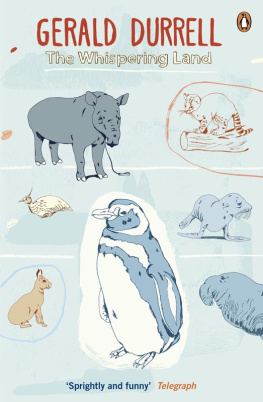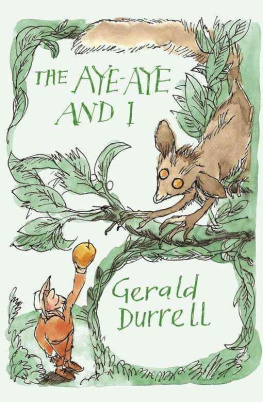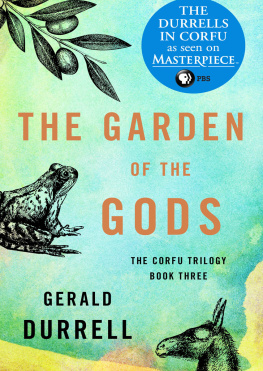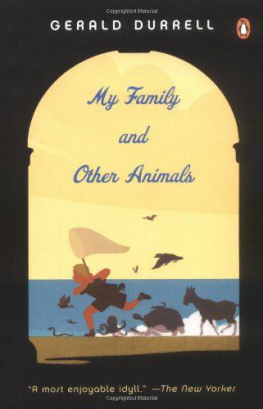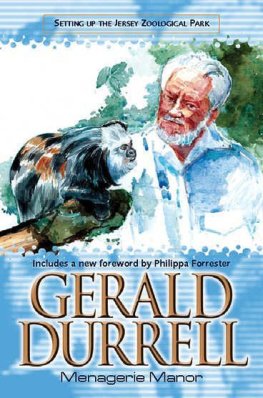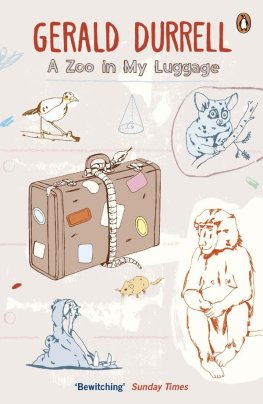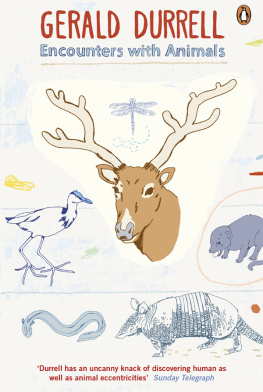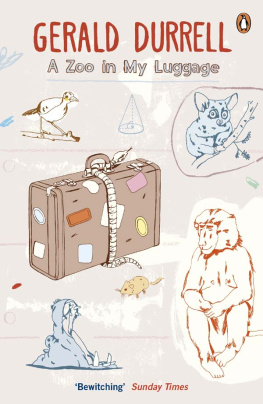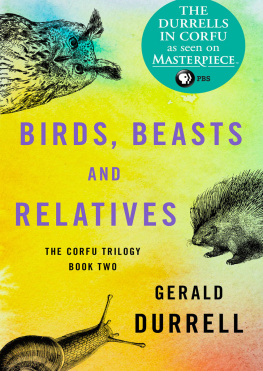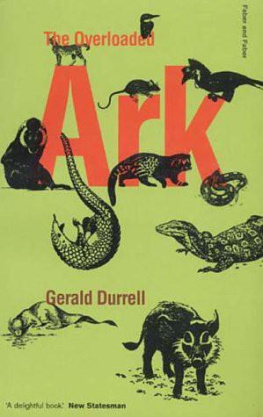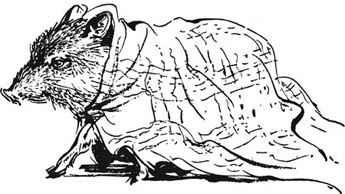PENGUIN BOOKS
THE WHISPERING LAND
Gerald Durrell was born in Jamshedpur, India, in 1925. He returned to England in 1928 before settling on the island of Corfu with his family. In 1945 he joined the staff of Whipsnade Park as a student keeper, and in 1947 he led his first animal-collecting expedition to the Cameroons. He later undertook numerous further expeditions, visiting Paraguay, Argentina, Sierra Leone, Mexico, Mauritius, Assam and Madagascar. His first television programme, Two in the Bush, which documented his travels to New Zealand, Australia and Malaya, was made in 1962; he went on to make seventy programmes about his trips around the world. In 1959 he founded the Jersey Zoological Park, and in 1963 he founded the Jersey Wildlife Preservation Trust. He was awarded the OBE in 1982. Encouraged to write about his lifes work by his novelist brother Lawrence, Durrell published his first book, The Overloaded Ark, in 1953. It soon became a bestseller and he went on to write thirty-six other titles, including My Family and Other Animals, The Bafut Beagles, Encounters with Animals, The Drunken Forest, A Zoo in My Luggage, The Whispering Land, Menagerie Manor, The Amateur Naturalist and The Aye-Aye and I. Gerald Durrell died in 1995.
Acknowledgements
As always after an expedition there are those people to whom ones gratitude is so immense that there is no way of adequately thanking them. All I can do is reiterate once more how much I appreciated their help and encouragement.
BUENOS AIRES
The entire de Sota family; the entire Rodrigues family; our dear friend Bebita Ferreyra; Lassie Greenslet; David Jones; Josefina Pueyrredon; Dicky de Sola; Brian Dean; Bill Partridge; and Willie Anderson.
All these people assisted us in countless ways, giving advice and helping us clear our equipment through the Customs; entertaining us lavishly and acting as drivers, translators, guides, carpenters and cooks, on our behalf.
People whose patience we tried, and whose houses and places of work we infested with our animals are: Blondie Maitland-Harriot; Mrs Dorothy Krotow; Dr Mario Teruggi. To them all we and our animals are most grateful.
To Dr Carlos Godoy, my special thanks, as he was so efficient and helpful over our collecting permits and in furnishing us with letters of introduction to many throughout the Argentine.
Dr Caberra was extremely helpful in giving us information regarding the Argentine fauna.
Mr Salmon of Bovril, Ltd was most kind and helpful. Mr Blackburn of Chadwick Weir arranged for the transportation of the entire collection and equipment from the Argentine, a massive undertaking.
PUERTO DESEADO
To Seor Huichi for his help we simply cannot express our gratitude enough. Captain Giri was instrumental in introducing us to Seor Huichi and for helping us find the penguin colonies. For both of these things we were most grateful. Mr Bateman, the British Vice-Consul, and his wife assisted us in every way possible, as did Mr and Mrs Roberts, the local Postmaster and his wife. All these people did their utmost to make our stay in Deseado a pleasant one.
PUERTO MADRYN
The manager of the Hotel Playa not only provided us with accommodation but lent us money, sent telegrams for us and helped us in every other way he could.
JUJUY
Charles and Joan Lett; Edna and Helmuth Vorbach; Luna, a very good friend, and everyone at Calilegua accepted me into their midst and did everything to help me build up my collection of animals, make my film and arrange everything for my comfort and salvation. Without them all I would have been lost.
MENDOZA
Dr Menoprio, who was so kind to us in many ways.
BRITAIN
Mr Peter Newborne of C.A.P., who was his usual helpful self and did all he could to assist us in the complicated matters of Customs facilities, etc. Dr Don Alberto Candiotti the former Argentine Ambassador in London, who gave the whole expedition his official blessing and encouraged us in every way. Mr Lawton Johnson of Bovril arranged for us to visit the various Bovril estates in the Argentine, which, unfortunately, we were unable to do; Mr Flack and Mr Aggett, of Blue Star Line, arranged passages for us all. The South American Saint Line kindly agreed to transport my entire collection and all my equipment from Buenos Aires to England, and in this connection I would like to thank the Captain and crew of the M.V. St John for enabling the return voyage to go smoothly, which was due entirely to their help and kindness.
The following British manufacturers supplied us with various equipment, without which the expedition would have been a complete failure. The Rover Company supplied us with our Land-Rover, in which we were able to travel all over the Argentine, and Mr Baldwin and Mr Bradley of the Companys Sales and Publicity Dept were extremely kind and helpful in enabling us to have this vehicle.
The Directors of William Smith (Poplar) Ltd, The British Nylon Spinners Ltd, and Greengate & Irwell Rubber Co. Ltd continue to earn our deep gratitude for the wonderful tarpaulins and animal shelters that they gave us on a previous trip. These articles, which are in constant use, have proved absolutely invaluable.
Finally, may we thank all those both here and in the Argentine who have helped us in many small ways, but without whose help the expedition could not have been successful.
The Customs of the Country
When you have a large collection of animals to transport from one end of the world to the other you cannot, as a lot of people seem to think, just hoist them aboard the nearest ship and set off with a gay wave of your hand. There is slightly more to it than this. Your first problem is to find a shipping company who will agree to carry animals. Most shipping people, when you mention the words animal cargo to them grow pale, and get vivid mental pictures of the Captain being eviscerated on the bridge by a jaguar, the First Officer being slowly crushed in the coils of some enormous snake, while the passengers are pursued from one end of the ship to the other by a host of repulsive and deadly beasts of various species. Shipping people, on the whole, seem to be under the impression you want to travel on one of their ships for the sole purpose of releasing all the creatures which you have spent six hard months collecting.
Once, however, you have surmounted this psychological hurdle, there are still many problems. There are consultations with the Chief Steward as to how much refrigerator space you can have for your meat, fish and eggs, without starving the passengers in consequence; the Chief Officer and the Bosun have to be consulted on where and how your cages are to be stacked, and how they are to be secured for rough weather, and how many ships tarpaulins you can borrow. Then you pay a formal call on the Captain and, generally over a gin, you tell him (almost with tears in your eyes) you will be so little trouble aboard that he wont even notice you are there a statement which neither he nor you believe. But, most important of all, you generally have to have your collection ready for embarkation a good ten days or so before the ship is scheduled to leave, for a number of things may happen in some ports that will put the sailing date forward, or, more irritatingly, backward, and you have to be on the spot to receive your orders. If there is something like a series of dock strikes to delay a ship, you may be sitting round kicking your heels for a month or more, while your animals appetites appear to increase in direct proportion to your dwindling finances. The end of a trip is, then, the most harrowing, frustrating, tiring and frightening part. When people ask me about the dangers of my trips I am always tempted to say that the dangers of the forest pale into insignificance as compared with the dangers of being stranded in a remote part of the world with a collection of a hundred and fifty animals to feed, and your money running out.

